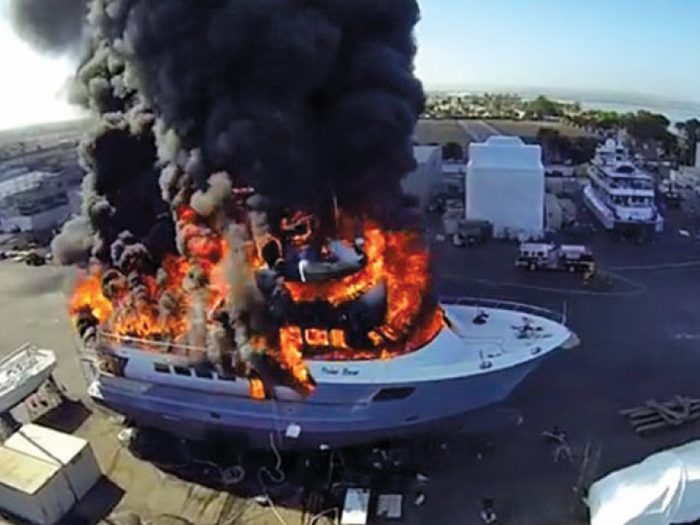Broker Liability
A $24 Million Yacht Burns: Its Owner Ignores Key Policy Terms and Conditions

Photo: Kurt Roll via YouTube
Whether a broker is in constant contact with an insured or merely checking in before renewals, it can’t change the fact that the onus for understanding and meeting a policy’s terms and conditions rests first and foremost on the insured.
That’s the painfully expensive lesson learned by millionaire Larry Jodsaas, the owner of the pleasure craft Polar Bear, a yacht that took five years and $24 million to build.
Smoke rose in San Diego Bay on the morning of June 19, 2014, above the Chula Vista shipyard where the Polar Bear was in drydock for repairs. A local ship captain sent up his drone to get a closer look. What he saw was any boat lover’s worst nightmare: The Polar Bear engulfed in flames.
The craft was a total loss.
Of Damages and Fires
The Polar Bear was en route to the shipyard for routine maintenance when it ran aground on the Zuniga Jetty at the entrance of the San Diego Bay.
The impact damaged the bottom of the hull, port and starboard sides of the keel and the aft port stabilizer shaft.
The yacht was covered under a Lloyd’s marine policy placed through Marsh, and the policy remained in effect while the vessel was undergoing routine maintenance in the shipyard.
When it arrived at the shipyard in May after hitting the Zuniga Jetty, the Polar Bear needed major repairs instead of the planned routine maintenance. Neither Jodsaas nor Roger Trafton, the ship’s captain, notified Marsh or Lloyd’s of the situation.
They reasoned the cost of repairs would be below the deductible.
Unfortunately, welding performed during repairs led to the demise of the Polar Bear.
Claims Denied
The broker on the marine policy, Katherine Johnson, provided Lloyd’s with a notice of loss the day after the fire. Lloyd’s, however, denied coverage.
The Polar Bear’s policy contained a repair clause stating that for major repairs or alterations involving hot work (welding), prior agreement must be obtained from the insurer. Failure to notify the insurer of the needed repairs voided the coverage in full.
Lloyd’s sought declaratory relief that it had justifiably denied coverage for the claim. Jodsaas, filing as Bear LLC (“Bear”), filed counterclaims against Lloyd’s and a third-party complaint against Marsh, asserting breach of oral contract, breach of fiduciary duty and negligence.
“As long as the insured, even with more advice from the broker, remains in the driver’s seat, [the special relationship] doctrine does not apply.” — Christopher St. Jeanos, attorney, Willkie Farr & Gallagher
In addition, Bear claimed a “special relationship” with Marsh, establishing a heightened duty to advise. Had Johnson dissuaded Bear from electing the Lloyd’s policy, it argued, it could have recovered the policy limit of $17.3 million.
A local ship captain spotted the plume of smoke and sent his drone in for a closer look at the fire consuming the Polar Bear.
The Court granted Lloyd’s summary judgment, holding that Bear had breached the terms of the repair clause. Marsh’s motion for summary judgment was granted in part and denied in part.
Claims for breach of contract, breach of general fiduciary duty and negligence were denied. But the claim for breach of a heightened duty to advise could proceed to trial. Contacted for this story, Marsh declined comment.
The Court’s Verdict
In the U.S. District Court in the Southern District of California, the court applied the “special relationship” doctrine narrowly. As other courts have in similar disputes, it examined the depth of the relationship between Bear and Marsh and the broker’s role in decision-making, among other elements.
It concluded that the services Marsh provided for Bear were the same as the services being provided for all of Marsh’s clients.
Also, the fact that the broker had not been notified of the jetty incident — and the fact that Johnson and Jodsaas had never met in person during their 10-year acquaintance — contradicted claims of a “deep relationship.”
“The court reconfirmed that [the ‘special relationship’ doctrine] is a narrow exception to the general rule that only applies in exceptional circumstances and found that the facts in this case did not trigger it,” said the lead attorney on the case, Christopher St. Jeanos of Willkie Farr & Gallagher.
A Broker’s Role
The question of who retains decision-making authority is a key factor in this case or any case where a “special relationship” with a broker is in question.
“As long as the insured, even with more advice from the broker, remains in the driver’s seat,” said St. Jeanos, “this doctrine does not apply.”
The court further noted there was no evidence the loss would have been paid if Johnson had advised Bear to select an alternate carrier. Under a Chubb policy that had been under consideration, conditions applied that would have required the insured to notify it of the jetty strike and subsequent major repairs.
“The entire case turns on Jodsaas’ and Trafton’s failure to provide notice,” said the court, also noting Bear had received notice of the repair clause conditions more than a dozen times.
While the yacht claim was a loss, Bear did settle a claim with the shipyard for $9.2 million. A judgment was also granted against the company performing the welding. However, that company folded after the incident, and its owners are thought to have fled the country. &











